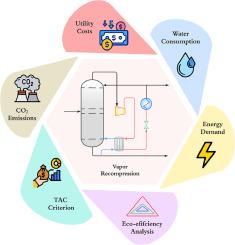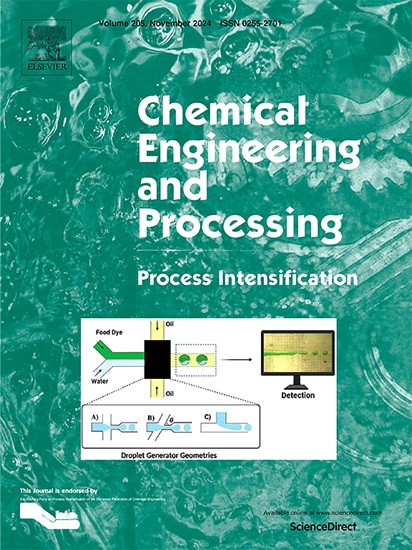生态效益分析和通过蒸汽再压缩策略强化一氯苯分离工艺
IF 3.8
3区 工程技术
Q3 ENERGY & FUELS
Chemical Engineering and Processing - Process Intensification
Pub Date : 2024-11-19
DOI:10.1016/j.cep.2024.110073
引用次数: 0
摘要
一氯苯被广泛用于生产除草剂、杀虫剂和药品,尽管它具有毒性且缺乏绿色替代品,但在商业上仍具有重大影响。因此,工艺强化可以提高净化工艺的可持续性性能。最近,有人提出了一种热集成双效蒸馏(DEDHI)方案,用于强化工业规模的单氯苯分离装置。作为延续,本研究提出了另一种基于热集成和蒸汽再压缩(VRHI)的策略。我们考虑了一个公用事业工厂在耗水量、二氧化碳排放量和公用事业成本方面的实际结果,并对这些结果进行了分组,以体现工艺的生态效益。此外,还考虑了总年化成本(TAC)标准。比较结果表明,DEDHI 和 VRHI 的生态效益分别比传统工艺高 84.57 % 和 96.21 %。DEDHI 设计更具经济吸引力,在 3 年投资回收期内可将总成本降低 21.40%。相比之下,VRHI 方案更加环保,二氧化碳排放量和耗水量分别减少了 73.32 % / 94.08 %(美国/巴西)和 84.87 %。然而,与传统工艺相比,VRHI 仅在 10 年投资回收期内具有经济吸引力,可节省 18.10 % 的 TAC,这主要是由于两级压缩机的资本支出和电力成本较高。本文章由计算机程序翻译,如有差异,请以英文原文为准。

Eco-efficiency analysis and intensification of the monochlorobenzene separation process through vapor recompression strategy
Monochlorobenzene is widely used in producing herbicides, pesticides, and pharmaceuticals and, despite its toxicity and lack of a green substitute, has significant commercial influence. Thus, process intensification can enhance the purification process's sustainability performance. Recently, a double-effect distillation with heat integration (DEDHI) scheme was proposed to intensify an industrial-scale monochlorobenzene separation plant. As a continuation, this work proposes another strategy based on heat integration and vapor recompression (VRHI). A utility plant was considered for realistic outcomes regarding water consumption, CO2 emissions, and utility costs, grouped to represent the process's eco-efficiency. The total annualized cost (TAC) criterion was also contemplated. The comparison showed that DEDHI and VRHI are 84.57 % and 96.21 % more eco-efficient than the conventional process, respectively. The DEDHI design is more economically attractive, reducing TAC by 21.40 % for a 3-year payback period. In contrast, the VRHI scheme is more environmentally friendly, reducing CO2 emissions and water consumption by 73.32 % / 94.08 % (United States / Brazil locations) and 84.87 %, respectively. However, VRHI is only economically attractive for a 10-year payback period, with TAC savings of 18.10 % compared to the conventional process, mainly due to the high capital expenditure for the two-stage compressor and the electricity cost.
求助全文
通过发布文献求助,成功后即可免费获取论文全文。
去求助
来源期刊
CiteScore
7.80
自引率
9.30%
发文量
408
审稿时长
49 days
期刊介绍:
Chemical Engineering and Processing: Process Intensification is intended for practicing researchers in industry and academia, working in the field of Process Engineering and related to the subject of Process Intensification.Articles published in the Journal demonstrate how novel discoveries, developments and theories in the field of Process Engineering and in particular Process Intensification may be used for analysis and design of innovative equipment and processing methods with substantially improved sustainability, efficiency and environmental performance.

 求助内容:
求助内容: 应助结果提醒方式:
应助结果提醒方式:


